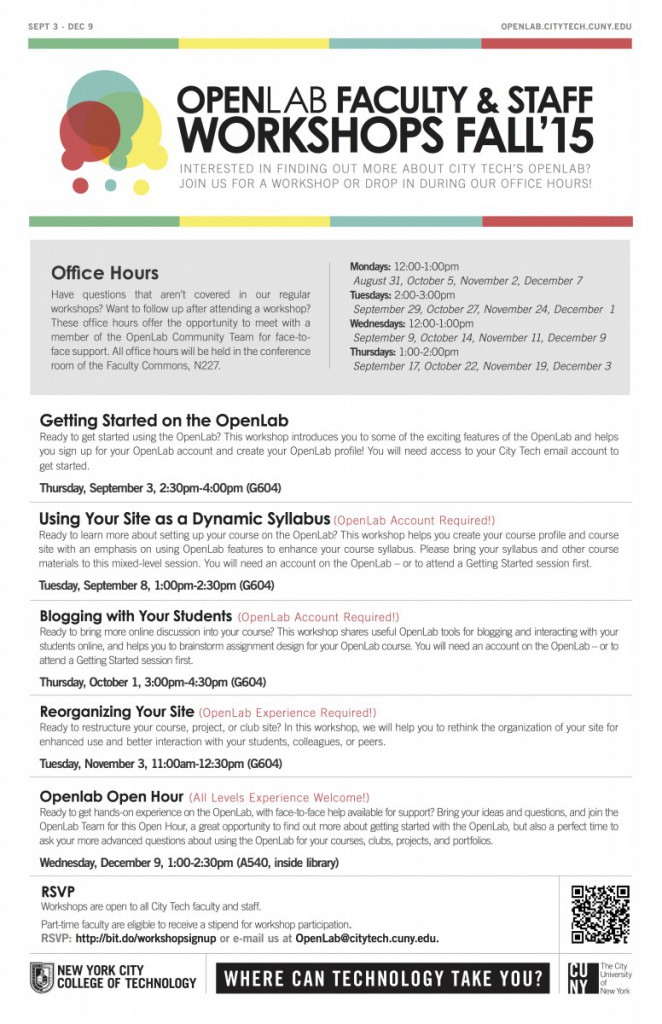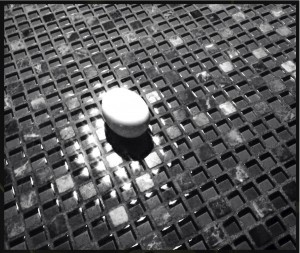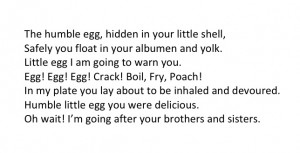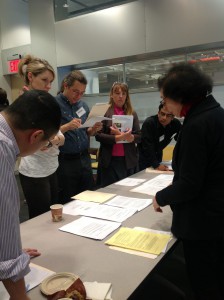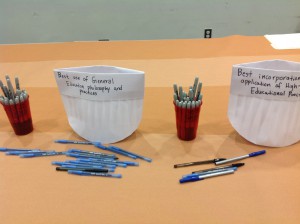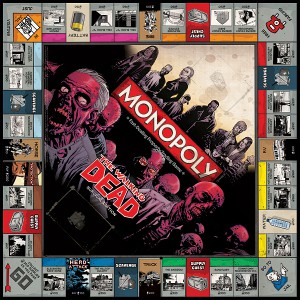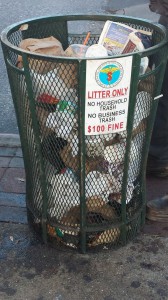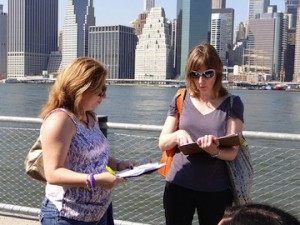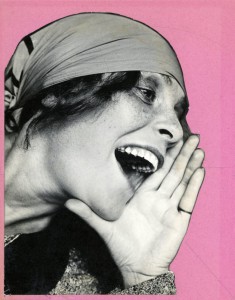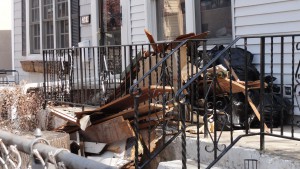
Remnants of destruction remain a year after Hurricane Sandy hit Sheepshead Bay
As the thick, warm air of a city summer dissipates into the crisp days of early autumn, it is timely to reflect on City Tech’s Living Lab project, a federally-funded grant aimed at re-imagining the role of general education in an urban college of technology. This fall, we embark on the fourth year of the project that has helped transform City Tech and our Brooklyn Waterfront into a living laboratory for our students. Each year, a select group of fellows has gathered in a semester-long series of seminars to enhance general education at City Tech, whether one is teaching first-year students, building a collaborative research team, or developing service learning projects. With two more years of the long-term grant to build durable and effective practices, a reflection of Living Lab activities demonstrates how the project has transformed teaching and learning for faculty and students alike.
Living Lab seminars are intensive with thought-provoking reading and lively debate, and they offer unique opportunities for collaboration among faculty from disciplines as diverse as Architectural Technology, Human Services, Math, Nursing, and English. Together, Living Lab fellows evaluate and work on implementing creative, high-impact pedagogical practices in their classrooms; and encourage each other to move beyond classroom walls to engage the larger community. Take for example two science courses, Professor Ralph Alcendor’s microbiology class and Professor Diana Samaroo’s chemistry laboratory that turned the waterfront into an experimental lab. Working in groups, Professor Alcendor’s students drew water samples from under the Brooklyn Bridge in order to gain a better understanding of the bacterial diversity of our environment. Student teams in Professor Samaroo’s class used their samples to conduct numerous chemical experiments back in the lab. The chemistry students even borrowed samples from Professor Alcendor’s biology course to test for differences in water quality before and after last fall’s catastrophic storm. The exercises helped nurture collaboration between students, as well as created opportunities for students to conduct field-based research and data collection. For Professors Alcendor and Samaroo, their involvement in the Living Lab seminars helped create the opportunity to pool resources for students enrolled in courses in different disciplines.
Such scientific experiments serve as an example of place-based learning practices promoted by the Living Lab, and they also highlight the environmental vagaries of New York City’s shoreline, which came into glaring focus a year ago when Hurricane Sandy devastated the city’s waterfront. Severe flooding damaged communities of numerous faculty, staff, and students, and even turned the old Klitgord auditorium into a temporary shelter. With the third year’s emphasis on academic service learning, Living Lab fellows took the opportunity to visit with a community organization in Sheepshead Bay, one of many seaside communities ravaged by the Superstorm. On the surface the sleepy community appeared tranquil and back to normal, but fellows quickly discovered the very real consequences of a devastating hurricane. Living Lab fellows met with local residents to listen to their first-hand recollections of their experience before, during, and after the storm and came away with a deeper understanding of the recovery process. Professor Soyeon Cho of Human Services noted how she was “able to look at the community not as a professor who teaches Human Services classes, but a person who is trying to examine the needs to provide actual help.” Meeting with hurricane survivors was dramatic, evoking Walt Whitman’s lines in Leaves of Grass “what is that you express in your eyes? It seems to me more than all the print I have read in my life,” a poetic statement that highlights the disjuncture between direct experience and experience mediated through media. The visit to Sheephead Bay was a perfect opportunity for faculty to directly engage a variety of issues that arise when one develops academic service learning projects for students, including methods to identify needs, assess situations, and the importance of one-to-one communication. Third-year fellows have initiated numerous academic service learning projects to foster student involvement in diverse communities to achieve lifelong impact. Professor Aida Egues of Nursing has noted how the “Living Lab has been the most incredible opportunity and platform for educators wanting to offer students altruistic, creative, and meaningful experiences through high-impact practices suited for developing the leaders of the future. ” In Professor Jason Montgomery’s Building Technology course for the Department of Architectural Technology, students have the opportunity to study the effects of Hurricane Sandy. One assignment requires students to redesign a storm-damaged brownstone in Red Hook, Brooklyn. Professor Jill Bouratoglou, also of Architectural Technology, assigns design projects for commercial and residential use in her Architectural Design class. As part of the design process, her student teams are required to visit and research their target communities. Each group reflects on and submits components of their research and design steps on the class website on the OpenLab, City Tech’s new online platform.
Professor Soyeon Cho strives to combine course objectives with a model of academic service learning in “Introduction to Human Services” for the Department of Human Services. She proposes using a semester-long project in which students identify a community and an active agency within it for a series of research papers, and reflective writing. Student teams are required to interview an agency and to create a means to survey clients in order to assess the agency’s impact. The collaborative student work promotes the practice of formal assessments, writing research reports that demonstrate the application of learned theories, enhanced personal observations, and peer evaluations.
This year in the Nursing Department, two Living Lab fellows Professors Aida Egues and Elaine Leinung, have enlisted other faculty members in their department, including Professor Lisette Santiseban, to help launch a service learning component for all students enrolled in the “Community Health Nursing” course. Full-time and part-time faculty will work with students on projects that meet course objectives while addressing health disparities in vulnerable populations throughout New York City. Collaborating in teams, students will perform comprehensive community assessments, and document their experiences on the OpenLab, posting self-reflections of meeting clinical objectives as part of their ePortfolios. Students will engage community partners through educational sessions, health assessments and fairs, media and political support initiatives, outreach, and training.
Other Living Lab fellows have explored the potential for applying the service learning model to communities within City Tech. Professor Andrew Parker of the Mathematics Department proposes including a service learning project in an introductory course for Math Education majors. Future math teachers would be paired with students in remedial math classes and required to create lesson plans. The transformative process of learning how to teach students of varying needs will be documented in a reflective paper. The project gives student teachers direct experience with pedagogical methodologies as well as engagement with the broader City Tech community.
Living Lab fellows have taken advantage of the interactive abilities of the OpenLab since it went live two years ago. With the capability to reach wider audiences than conventional learning management systems, the OpenLab increases the possibilities of student interaction with fellow students, faculty, and the greater community. At last count, the OpenLab boasted over 7,000 users, who have filled the site with stunning student portfolios, class websites, and virtual spaces for a diverse range of university groups. The OpenLab is a vibrant online community that has given students more access to each other and to professors than ever before. Promoting open access, many OpenLab courses are public and therefore visible to anyone with access to the internet allowing those in the “real world” to see what’s happening at City Tech. The next group of cohorts will focus on the role of general education in capstone courses and the development of internship opportunities. A university-wide dissemination event took place on September 27th. Applications are due November 7, 2013. Come join us!
The above post is published in Nucleus, the Faculty Commons quarterly publication.

